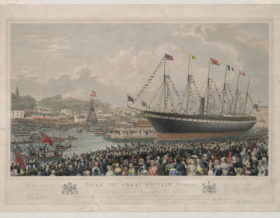Challenging law and order: British riots and reforms
In the early 1800s, Britain was suffering serious social problems. Unemployment was widespread, wages were low, and living and working conditions were poor. Ordinary people had no official voice, there were no workers’ unions, and women and working-class men were not allowed to vote. The main way ordinary people could make their voices heard was by protest. But the effects of the French Revolution made the establishment fearful of any activity they thought might challenge them, which meant they often overreacted. This transformed peaceful protest into violent skirmishes on a number of occasions such as the Peterloo Massacre in Manchester, when 11 people died at the hands of local armed forces. It also led to extreme punishments for those involved, such as the transportation of the Tolpuddle Martyrs to Australia after they attempted to form a trade union, and the executions of Richard Parker following the Nor Mutiny and Dic Penderyn – wrongly convicted of stabbing a soldier during the Merthyr Rising.





























